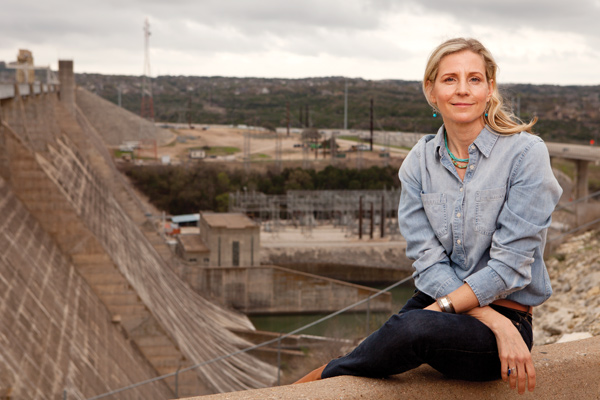In the past, STEM and the arts and humanities have largely been taught as unconnected disciplines, but there is more overlap between fields than many realize.
Erika Bsumek, an associate professor of history in the College of Liberal Arts and a 2018 recipient of the Regent’s Outstanding Teaching Awards, wants to help students see how different disciplines are connected. In her class, Building America: Engineering Society and Culture, 1868-1980, Bsumek teaches humanities and STEM majors how history, culture and politics have shaped technological advances and, in turn, how technology has restructured society in numerous ways in the process.
Bsumek, who also teaches Native American and Environmental history, strives to help all of her students see the world around them in new ways. She says learning history can be interesting and even fun. The more history they learn, the better prepared they will be to solve the biggest challenges society faces now and in the future. Here are four reasons why she says learning history can help them do that.
- It helps us understand how our time is different from or similar to other periods.
In today’s world, where people often cherry pick facts about the past to prove points, it helps to place current events in historical context. History is an evidenced-based discipline. So, knowing how and where to find the facts one needs to gain a fuller understanding of today’s contentious debates can help us understand not only what is being said, but it can also help us grasp what kinds of historical comparisons people are making and why they are making them.
For instance, understanding how Native Americans were treated by both white settlers and the federal government can help us better understand why indigenous communities often resist what many non-American Indians view as seemingly “goodwill gestures” or “economic opportunities” — such as the proposed construction of a pipeline on or in proximity to Native land or a proposal to break up reservations into private parcels. Both kinds of actions have deep histories. Understanding the complexities associated with the historical experiences of the people involved can help build a better society.
- History helps you see the world around you in a new way.
Everything has a history. Trees have a history, music has a history, bridges have a history, political fights have a history, mathematical equations have a history. In fact, #everythinghasahistory. Learning about those histories can help us gain a deeper understanding of the world around us and the historical forces that connect us and continue to influence how we interact with each other and the environment.
For instance, when we turn on the tap to brush our teeth or fill our pots to cook we expect clean drinking water to flow. But, how many people know where their water comes from, who tests it for purity, or how society evolved to safeguard such controls? To forget those lessons makes us more prone to overlook the way we, as a society, need to continue to support the policies that made clean water a possibility.
- History education teaches us life skills.
In history courses, we learn not just about other people and places but we learn from them. We read the documents or materials that were produced at the time or listen to the oral histories people tell in order to convey the meaning of the past to successive generations. In doing so, we learn that there is just not one past, but a pluralism of pasts. This kind of knowledge can help the city manager and the engineer plan a new highway, city or park. It can also help us navigate our daily lives and learn to ask questions when we encounter people or places we don’t initially understand.
- Studying history teaches students the skill sets that they will need in almost any major or job.
Studying history and other humanities can not only pique one’s imagination and engage students, history courses can also help students learn how to take in vast amounts of information, how to write and communicate those ideas effectively, and, most importantly, to accept the fact that many problems have no clear-cut answer. As a result, history classes help students to cultivate flexibility and a willingness to change their minds as they go about solving problems in whatever field they ultimately choose.
Performance in history courses can also be a good indicator of a student’s overall ability to succeed in college. A recent article by the American Historical Association reports that “two national studies that show that college students who do not succeed in even one of their foundational-level [history] courses are the least likely to complete a degree at any institution over the 11-year period covered by the studies.” Why? The skills one learns in a well-taught history course can help students develop a flexible skill set they can use in their other classes and throughout their lives.
Featured image: Erika Bsumek at the Mansfield Dam located in Austin, Texas. Photo by Kirk Weddle.
